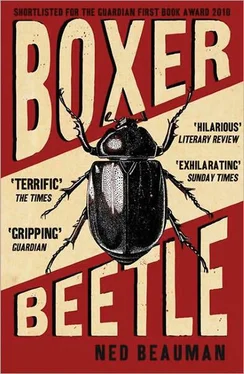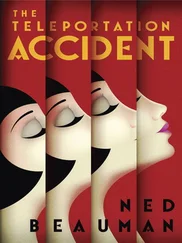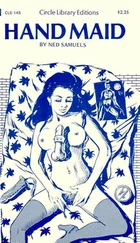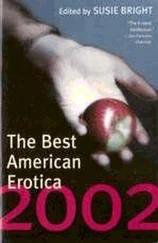‘And you don’t speak like that to a woman,’ she said, slightly flushed. She went out.
Sinner sat down in an armchair, rubbing the back of his head, surprised at how deeply he’d allowed Evelyn to irritate him, and knowing, really, that it was because of how deeply Erskine’s sister reminded him of his own. The sister he’d once had. Anna.
The last time he’d seen Anna, he was fifteen and she was only twelve, eyes still too big for her head. One Friday night the whole family was at home in the flat on Romford Street, in the big all-purpose room which they called the kitchen. Sinner’s mother was at the hob cooking chicken soup, Anna was determinedly trying to teach Sinner to knit, and Sinner’s father was sitting with three or four of his old friends from his home village, grumbling about business over a Polish card game called Ocka on which they were gambling with shillings. After losing nine hands in a row, Sinner’s father had stamped his foot and said to one of his friends, ‘You took three cards instead of two.’
‘I took two cards.’
‘You took three. You thought I wouldn’t notice?’
‘I took two.’
‘Cheating,’ said Sinner’s father. ‘Cheating again,’ he roared. Then he rose from his stool, picked up the rickety little fold-up table on which they were playing and hurled it out of the open window. There was a crash outside followed by a couple of startled oaths. Sinner jumped up, ran down three flights of stairs almost before the first ace had hit the cobbles below, and started snatching up the coins that had scattered across the street. He’d picked up nearly £2 in shillings before he turned and saw that his sister had followed him down.
‘Go back upstairs, Anna,’ he said.
‘Are you going to buy sweets?’ she said. She was wearing one of his old shirts.
His father appeared at the door of the tenement block. ‘Come back here with our money, you little shits.’
Sinner ran.
When he got back that night, drunk, he found his mother in the room that he shared with Anna. (He’d slept in the same bed with her for most of his life. In the world he knew, it wasn’t unusual for brothers to end up fucking their sisters, or at least to come close, and he was proud that he’d never touched her like that.) His mother was holding a cold wet cloth to a green bruise on Anna’s head. Anna was half-awake and mumbling. Sinner went into his parents’ room, woke up his father, and beat him until his face was all blood and he was cowering in the corner beside his mother’s sewing machine. Then he went back into the other bedroom and took over with the cloth from his mother, who went out. The next morning he said goodbye to Anna and went to the gym to train with Frink. In the evening he had a match at Premierland, at the bottom of the bill, and a man in the crowd came up to congratulate him afterwards, and he lived for about a week in that man’s flat; he tried cocaine there for the first time, but he didn’t like the blank and cubic tone it gave his orgasms. When he finally went home again, Anna wasn’t in the flat.
‘Where is she?’ he said to his mother.
‘She’s gone. Your father’s out looking.’ She’d been crying.
‘What the fuck do you mean she’s gone?’
‘I went out and I came back and she wasn’t here.’
‘Why are you looking at me like that?’
‘If you stayed with us, Seth,’ said his mother. ‘If you stayed with us this wouldn’t happen.’
‘Stay with you? Every day and night until he dies or fucks off somewhere else?’ said Sinner.
‘Just until she finds a husband to take her away.’
‘Every day and night?’
‘Why not? Why can’t you? Because of prizefighting and girls? Stay with us, or just go. He hits her because he can’t hit you. God above! If you weren’t here at all, he wouldn’t want to hit so much. If you were here all the time, he would want to hit, but he couldn’t. But you come and go. You stay just long enough to make him angry and then you disappear. Do you think it helps when you come back here once a week to punish him? That just makes it worse for her. And for me.’
Sinner went out to look for Anna himself. He never found her. And when he lost Anna, whom he loved, he lost more than just a sister. Because he was certain that Anna — just like, it now seemed to him, Erskine’s sister Evelyn — had known something important about her brother long before her brother had really known it himself. She used to smile one way when she heard their mother blather to him about local girls and another way when she saw him stare at a handsome man in the street, neither smile her usual smile, which rose slowly in her face like a glass filling with orange juice until it overflowed into laughter. She was only twelve but she knew him in a way that no one else had ever known him. So what else was there to find out about himself that she had never told him, and could never tell him, now that she was gone? What other secrets of Sinner’s had been washed away with her in the rain?
At twenty-two, just down from Cambridge and not very happy, Erskine had begun a three-month period of rigorous self-experimentation in imitation of his hero Francis Galton. Of the experiments he had performed in that time, four were particularly memorable.
The first was very brief. For most of his life, Erskine had wondered if the unconscious processes of the body could be subjugated more fully to the conscious mind. So one day, as a preliminary study, he sat down on his bed at home in Claramore and, for half an hour, concentrated only on inhaling and exhaling. Then he turned his attention to an essay he was planning about the genus Ceratophaga (the moth that eats nothing but dead horses’ hooves and dead tortoises’ shells) and commanded his body to go back to breathing without supervision as it normally did, rather as one might impatiently send a child off to play.
But his body ignored him, and he continued to feel as if he’d suffocate and die unless he specifically willed each breath. After several minutes of panic in which he wondered if he had permanently shut off some gasket in his brain and would never be able to concentrate on anything else again for the rest of his life, he realised he was breathing without thinking — but as soon as he realised, he stopped again — panicked, started, realised, stopped — again and again — and it wasn’t until his mother knocked on his door to tell him about his sister’s early return from holiday that the torture was interrupted. Three far more ambitious related projects had been planned — to fall asleep at will, to stop his nasal mucosa from producing unwanted mucus, and to pace his digestive system so that he could eat a huge breakfast every day and then skip lunch without feeling hungry — but he decided to postpone them all in case he did himself some sort of lasting damage.
After that, he wanted to know if the mind could ever be quite as unruly as the body. So for two weeks he carried a notebook, and every time he made a decision to do something, however unimportant, he made some rapid notes about the circumstances, then before bed he would expand on those notes in detail. And in all that time he couldn’t find a single action that was, in Galton’s words, ‘uncaused and creative’: everything he did, every so-called whim or fancy or inspiration, was a consequence of utterly predictable and conventional desires or obligations, and those in turn could probably be traced back to some banal combination of heredity and environment. This depressed him. Then, on the fifteenth day, he was passing his sister’s bedroom when he saw on her dressing table a picture, torn from a newspaper, of the young French bank robber Alexandre Stavisky, known as le beau Sasha . He went into the room and stared at the photo for some time, then went back to his own room and took out his notebook, but he wasn’t sure what to write down: he had no particular interest in crime and punishment so there was no earthly reason why he should have looked at the photograph. He abandoned the experiment.
Читать дальше











